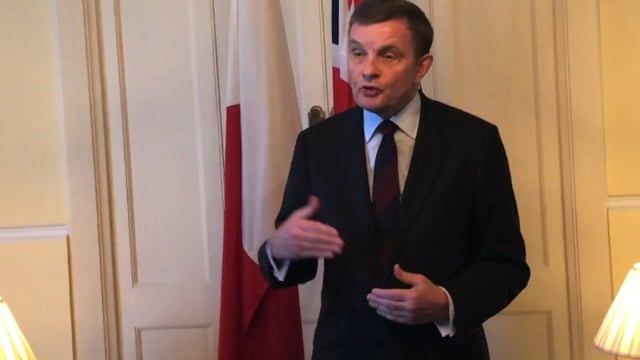[WATCH] Brexit Minister: ‘We don’t expect UK and EU to punish each other’
UK minister says he finds it hard to believe that Malta and the UK won't be able to reach a mutually-beneficial bilateral agreement once the Brexit negotiations are concluded


The United Kingdom does not punish its friends and it does not expect its friends in the European Union to seek to punish the UK during the Brexit negotiations, according to David Jones, UK Minister for the Department for Exiting the European Union.
Jones, who met media for a briefing on Monday ahead of Tuesday’s informal meeting in Malta of the member states’ ministers for EU affairs, insisted that despite British Prime Minister Theresa May’s announcement that the UK will not seek to remain in the single market, everything was still up for discussion.
“This does not mean that we will not seek agreement on protecting the many UK citizens in the EU and the equally numerous EU citizens in the UK,” he said. "In fact we feel this issue should be discussed early in the negotiations, indeed I believe it should be the first issue discussed."
As to Malta in particular, Jones said he found it difficult to believe that two countries with such close relations as Malta and the UK, would not be able to reach a mutually-beneficial bilateral agreement once the Brexit negotiations were concluded.
The United Kingdom does not punish its friends and it dies not expect its friends in the European Union to seek to punish the UK during the Brexit negotiations, according to David Jones, UK Minister for the Department for Exiting the European Union.
Jones, who met media for a briefing on Monday ahead of Tuesday’s informal meeting in Malta of the member states’ ministers for EU affairs, insisted that despite British Prime Minister Theresa May’s announcement that the UK will not seek to remain in the single market, everything was still up for discussion.
“This does not mean that we will not see agreement on protecting the many UK citizens in the EU and the equally numerous EU citizens in the UK,” he said.
As to Malta in particular, Jones said he found it difficult to believe that two countries with such close relations as Malta and the UK, would not be able to reach a mutually-beneficial bilateral agreement once the Brexit negotiations were concluded.
“We will discuss terms that will equally benefit the 5,000 or so British expats in Malta and the many Maltese living, studying and working in the UK,” he said. “We certainly want to remain good friends with the Maltese people.”
Jones confirmed that trade would be high on the agenda of May’s talks with the newly-elected US president, Donald Trump, in Washington on Thursday.
He also played down fears of multi-national companies, including banks, igaming companies and major corporations, moving away from the UK and to an EU member state for access to the single market, following Britain’s exit.
“I do not agree this is such a big concern as many make it to be, because I am sure the matter will be brought up in negotiations with the EU,” he said. “One must keep in mind that once the UK leaves the EU, it will still remain the EU’s largest export market.”
He said that, contrary to Canada and other countries seeking agreements with the EU, a post-Brexit UK would still have all the policies in place that make it compatible with EU regulations and procedures.
Another issue Jones expects to be brought up early in the Brexit talks is the Open Skies agreement – an EU-US air transport agreement that allows any EU and US airline to fly between any point in the EU and the US.
“I am positive that all parties involved recognise the importance of the Open Skies agreement and will seek to reach an agreement on the matter," he said.






.jpg)















